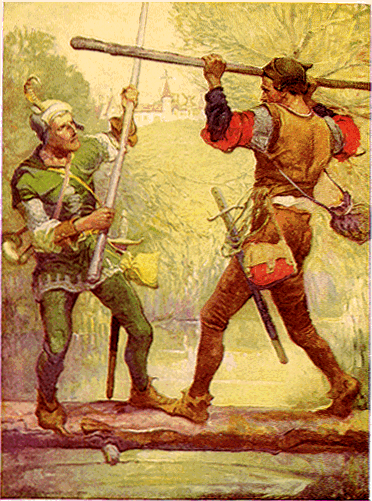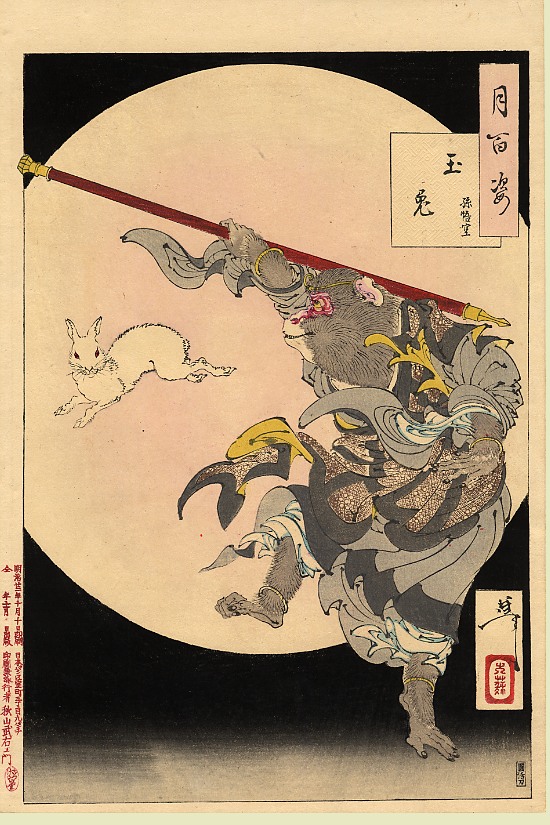These are my thoughts on
The Monkey King- Sun Wu Kung...
Handsome King of Apes:
This story already seems allegorical. Is Sun Wu Kung the stone ape that is hatched out of the magic egg in the story? Also, it seems kind of weird that the gods would be afraid of the stone ape, because they are gods after all. This island seems pretty cool though. Maybe it is a Chinese version of the garden of Eden?
The Great Sea:
So Sun Wu Kung is the Ape King. The Monkey King is not just a nickname, he really is a monkey, at least in the story. The Ape King leaves his perfect island, so that he can go to the realm of the mortals and find the secrets to immortality from the Buddhas or the blessed spirits. He seems to look down on the human pursuits of honor and wealth.
Sun Wu Kung Gets His Name:
He finds a wood-chopper in the mountains that leads him to a divine teacher in the "mountain of the heart." I wonder why the writer included the wood-chopper? The teacher then gives him his name and instructs him in cleaning, working the fields and other menial tasks. When he begins to teach truth, Sun Wu King dances for joy.
The Master:
The master offers to teach Sun Wu Kung the way to the truth, but Sun Wu Kung refuses to learn all of them, because none of them offer a way to earn eternal life. While being rebuked, Sun Wu Kung realizes that he is supposed to visit the master late at night. Your notes say that Sun Wu Kung is a representation of the "monkey mind."
Learning the Art:
The master does end up teaching Sun Wu Kung the incantation that will lead him to eternal life. He also warns him that three troubles will befall him, and he has to overcome these if he wants live as long as the heavens. In order to prepare him, the master teaches him an incantation that allows him to shape-shift. He also learns to fly.
Sun Wu Kung Departs:
Sun Wu Kung gets kicked out by the master after showing off for the other disciples. I'm sure this is supposed to teach the reader a lesson. Sun Wu Kung initially scoffed at the human pursuits of honor and wealth, but it seems like he has given into the notion of impressing those around him. The master threatens him with hell if he tells anyone of his teaching.
The Devil King:
Sun Wu Kung returns to his home island to find that a devil king has captured many of his children. He goes to confront the evil king, and he uses his new found magic power to defeat the king. He transforms one of his hairs into little apes who aid him in his fight. Maybe this was one of the three dangers he would have to overcome?
The Dragon King:
The Monkey King is turning into a General. He is teaching his people how to fight. However, he cannot find a weapon that suits himself. So, he goes to see the Dragon King, be he still cannot find a weapon that is heavy enough for him. For someone so learned, it seems that having a weapon is unnecessary.
The Dragon Queen:
The queen tells the king to show Sun Wu Kung some magical staff that was used to measure the depths of the ocean by some god. Sun Wu Kung is finally satisfied by this weapon, but then he demands a suit of armor. The Dragon King calls his brothers together, and they give Sun Wu Kung a suit of golden armor. The Monkey King is beginning to come across as a huge jerk. I bet he is humbled soon.
The Nether World:
He is dragged to the nether world in one of his dreams. There, he uses his power to erase his name and all the other apes' names from the book of life. Thus, they never died. However, all of these other powers are beginning to complain about him to the lord of the heavens. So i wonder what is going to happen with that
Lord of the Heavens:
Word of Sun Wu Kung's exploits reach the Jade Emperor, the lord of the heavens. However, nothing bad happens to him. Instead, he is rewarded with a position in the heavenly stables, where he excels. For how arrogant and "monkey-minded" he is, Sun Wu Kung always seems to do pretty well.
The Great Saint:
Naturally, Sun Wu Kung, who keeps calling himself the "Venerable Sun," feels that the stablemaster position is beneath him. So, he returns to his mountain. There two demon-kings tell him that he should be called the "Great Saint Who is Heaven's Equal." He agrees. This has the feel of Lucifer trying to call himself equal to God, before being cast out of heaven.
Notscha, Son of Li Dsing:
Hearing of Wu Kung's revolt, the Jade Emperor sends out other deities in order to capture him. However, Sun Wu Kung is too strong, so they decide to grant him his title. Again, it is the evening star who advises the Jade Emperor to this course of action. Why is such arrogance rewarded?
The Queen-Mother of the West:
This definitely has a biblical feel. Sun Wu Kung is ordered to watch over a peach orchard, but these peaches grant immortality. Sun Wu Kung eats all of them, so there are hardly any left when the Queen-Mother tries to prepare her banquet.
Laotzse:
He is so irresponsible and selfish. He ends up stealing a large amount of wine and pills from various deities' houses. He is a terrible hero, who has done nothing to help anyone except himself. He's definitely not a positive character. Maybe he'll get redeemed?
Guan Yin:
Sun Wu Kung defeats all of the heavenly host, seemingly, pretty easily. I thought it was interesting to note that the Lord of the Heavens was able to be frightened. These gods don't appear to be very god-like. Anyways, one champion is chosen to defeat Sun Wu Kung, and it is the Jade Emperor's grandson.
Yang Oerlang:
Yang Oerlang ans Sun Wu Kung have an epic battle. It's full of shape-shifting and what not, but this is the first time that we have ever seen Sun Wu Kung run. He has finally met his equal. So it seems at least. He's still an arrogant punk, trying to take over Yang Oerlang's own temple.
Buddha:
Sun Wu Kung is finally captured, but the gods have no way of executing him. They try to throw him in an oven, but even that doesn't work. So the Jade Emperor asks Buddha for help as a last resort. The Buddha comes not to fight him, but to "tame" him.
The Destiny of Sun Wu Kung:
The Buddha is finally a force that is more powerful than Sun Wu Kung. He ends up trapping him beneath a mountain, from which he is released after many hundred years. It says that he is polite and respectful from that time forward, but that is tough to believe.
Journey to the West (Synopsis):
Everything up to this point has only been a minor introduction to the characters. In the rest of the story, it seems like Sun Wu Kong plays a pretty minor role. However, it is said that he attains buddhahood at the end of his journey. I still don't like him very much.
Journey to the West (conclusion):
Through all the travels it seems like Sun Wu Kung redeemed himself. He appeared to actually make sacrifices and think about other more than himself, which would finally make him heroic, in my opinion. Lucky for him, he was given many second chances.










